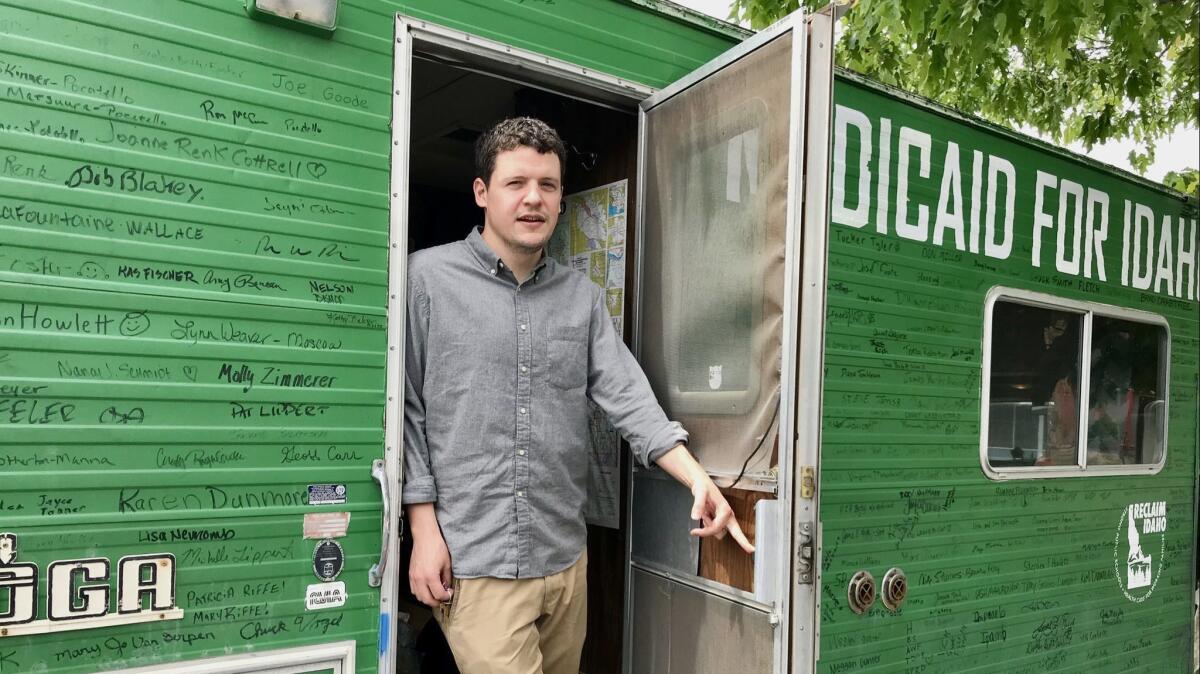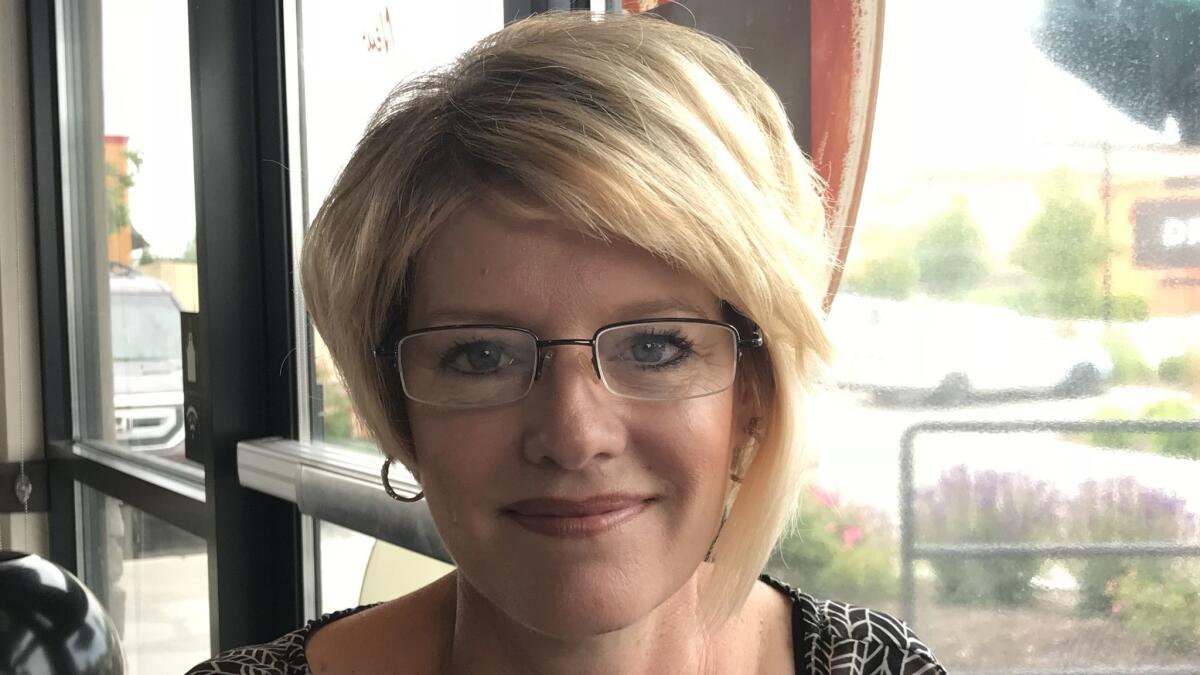Obamacare used to be political poison for Democrats. Now they see it as a winning prescription — even in red states

- Share via
Reporting from Boise, Idaho — For years Democrats ran from the healthcare issue as though it were a heap of flaming rubble, which, politically speaking, it was.
Passage of the Affordable Care Act cost them control of Congress, gave rise to the upstart tea party movement and helped install Donald Trump in the White House.
But polls show support for the law increasing as it becomes more imperiled, and the result has been a political sea change.
A backlash to GOP repeal efforts has emboldened Democrats, who think they can seize back the House, dramatically expand coverage and turn healthcare from an albatross to an advantage even in red states like Idaho, with the help of Republicans like Christy Perry.
The Idaho state representative is a down-the-line partisan who supports President Trump, opposes abortion and boasts an A-plus rating from the National Rifle Assn. But Perry breaks with many fellow conservatives when it comes to helping those who can’t afford insurance.
“People should be working and you should be carrying your own weight,” Perry said. “But we can’t just assume all people are created equal in this regard, because sometimes they’re not, and there are people who struggle with things through no fault of their own.”
Come November, voters in Idaho will likely weigh a ballot measure that would expand Medicaid to more than 60,000 hard-pressed residents, bypassing a conservative Legislature that has consistently blocked the move and thwarted advocates like Perry.
Similar end runs are being attempted in Nebraska and Utah, states Trump carried, where GOP lawmakers have also balked at extending coverage under the law. In Montana, another Trump state, a petition drive is underway to continue Medicaid expansion beyond its scheduled June 2019 finish.
Democrats have gotten the message, campaigning on healthcare not just in blue states like California, or swing states like Nevada and Florida, but red states like Kentucky, home of Senate Majority Leader Mitch McConnell, who once vowed to eradicate the Affordable Care Act “root and branch.”
In Lexington, congressional hopeful Amy McGrath has attacked incumbent Republican Andy Barr for “enthusiastically” voting to strip healthcare coverage from more than a quarter-million Kentuckians — “many of the same kind of people,” she said in a campaign video, that her mother, a polio survivor, treated as a doctor.
The television spot, which helped catapult McGrath to an upset win in last month’s primary, is one of more than 26,000 healthcare-related ads broadcast by Democratic candidates across the country, according to Kantar Media’s Campaign Media Analysis Group.
“We haven’t seen anywhere we don’t think healthcare works as a political issue and also as a substantive issue,” said Brad Woodhouse, campaign director of Protect Our Care, an advocacy group fighting to buttress the Affordable Care Act.
The equation has clearly changed.
Democrats “don’t have to defend how the ACA works” as they did when President Obama was in the White House, said Robert Blendon, a Harvard expert on healthcare politics.
“They just have to say, ‘The other party wants to take coverage away from millions of people,’” he said.
We haven’t seen anywhere we don’t think healthcare works as a political issue and also as a substantive issue.
— Brad Woodhouse, a Democratic strategist, on the changed political dynamic surrounding the Affordable Care Act
On Thursday, the Trump administration further roiled the debate by stating in court that it would not defend one of the law’s most popular provisions, which forbids insurance companies from denying coverage to customers with preexisting conditions or charging them more.
Woodhouse can attest firsthand to the political shift. He was communications director at the Democratic National Committee in 2010, when Republicans campaigning against Obamacare won 63 seats and took control of the House in a landslide.
Four years later, again promising repeal, the GOP claimed the Senate and won their biggest House majority since World War II.
In 2017, finally controlling both Congress and the White House, lawmakers set about to fulfill their pledge, failing by a single vote in the Senate when Arizona Republican John McCain delivered a dramatic thumbs-down.
By then, scores of GOP lawmakers were on the record supporting a rollback that would have resulted in 23 million fewer Americans having health insurance; like that, repeal was no longer a mere campaign slogan or partisan rallying point.
“Those threats were now very real,” said Jesse Ferguson, a campaign spokesman for congressional Democrats during several cycles when they were clobbered by the healthcare issue.
Today, surveys suggest most Americans see the legislation in a generally positive light, a reversal from most of its eight-year history.
“Trump has polarized people around this issue and drawn the lines very clearly,” said Luke Mayville, who helped launch the Idaho drive to put Medicaid expansion on the ballot.
Support is far from overwhelming, however, and Jesse Hunt, a spokesman for the GOP’s House campaign committee, said Republicans “were happy to litigate” the Affordable Care Act between now and November.
Democrats “are responsible for the current problems that we have in our healthcare system as a result of Obamacare,” said Hunt, noting the law passed without a single Republican vote. “People still remember who started this mess.”
He suggested Democrats, if empowered, would make things worse through a government takeover of the healthcare system, a move backed by many on the political left, including several 2020 presidential hopefuls.
Many running this year, however, aren’t pushing for a so-called single-payer system. Rather, they promise to fight repeal of the Affordable Care Act — which the Trump administration continues to pursue — or call for expanding Medicaid, the federal program for the poor, disabled and nursing home residents that, polls show, enjoys strong support even among Republicans.
Here in Idaho, the focus is the estimated 62,000 residents who earn too much to qualify for Medicaid but not enough to pay for coverage through the state’s healthcare exchange. Legislators have fought over “the coverage gap” for years without resolving the issue.
So Mayville, 33, and Garrett Strizich, 32, sought to put the question of Medicaid expansion directly to voters. The two former high school classmates from tiny Sandpoint were convinced a small bloc of obstructionists has ignored a broad consensus that something must be done.
“It was clear to us just by discussing things with ordinary people in our community that there’s widespread concern,” said Mayville, who divides his time between Idaho and New York City, where he teaches at the Center for American Studies at Columbia University.
Along with Strizich, a medical student, he piloted the “Medicaid Mobile” — a 1977 Dodge Tioga RV with horrible green shag carpeting and a tendency to overheat — 4,000 miles around the state, collecting signatures to place the initiative on November’s ballot.
(Separately, the effort also received $500,000 in support from the Fairness Project, a union-backed liberal group that has spent millions around the country pushing Medicaid expansion, including a ballot measure that passed last fall in Maine.)
Idaho’s secretary of state is expected to complete a review of signatures by mid-July, with preliminary tallies suggesting the initiative is all but certain to qualify.
The Idaho Freedom Foundation, a libertarian think tank that has been instrumental in blocking Medicaid expansion in the Legislature, is prepared to oppose the ballot measure.
Fred Birnbaum, the foundation’s vice president, said a robust economy means anyone in Idaho who is able-bodied and looking can find a job and, even working part-time, earn enough to purchase subsidized coverage on the state exchange. “This basically is propping up the failed Obamacare,” Birnbaum said.

But Perry, the conservative lawmaker, said it’s time to move past repeal, which has been Republican holy writ, and find ways to improve the Affordable Care Act.
“We need to take care of the people,” she said over coffee in Nampa, a Boise suburb she has represented in the state House for the last eight years. “Then we need to be able to come back and work on the policy.”
Meantime, the Medicaid Mobile, its army-green skin covered in black felt-tip signatures, sits beneath an oak canopy on a busy street west of the Capitol in Boise, ready to roll into the fall campaign.
More to Read
Get the L.A. Times Politics newsletter
Deeply reported insights into legislation, politics and policy from Sacramento, Washington and beyond. In your inbox twice per week.
You may occasionally receive promotional content from the Los Angeles Times.











